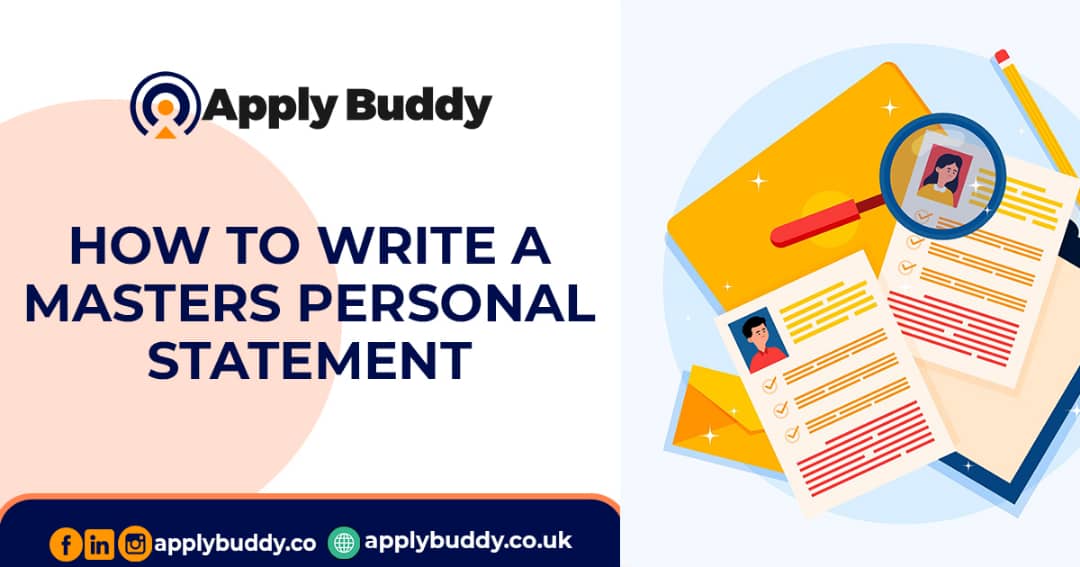Deciding to pursue a master’s degree is such an exciting and important step in your academic and professional journey! When it comes to your application, knowing how to write a master’s personal statement is really key. It gives you a great chance to show off your personality, achievements, and dreams to the admissions committee.
Crafting a personal statement can feel a bit overwhelming, but if you approach it the right way, you can make it into a really interesting story that highlights your strengths and makes you stand out from other candidates. Whether you’re interested in a program in business, science, arts, or any other field, your personal statement is your chance to make a real impression.
Think of it as your spotlight, where you can share the experiences that have shaped you, the goals you are passionate about, and why you are the perfect fit for the program.
In this blog post, we’ll guide you through the steps to create a compelling narrative that captures your unique journey and aligns perfectly with the admissions committee’s expectations. We’ve covered everything, from brainstorming ideas to polishing the final draft. So, let’s dive into how to create a personal statement for your master’s that genuinely stands out and makes the reader eager to learn more about you!

What is a Personal Statement Letter?
A personal statement letter is a narrative that provides a glimpse into who you are beyond your grades and test scores. It is your chance to articulate your motivations, experiences, and goals, explaining why you are passionate about the field of study you are applying to. Think of it as a conversation with the admissions committee, where you get to share your story and demonstrate your suitability for the program.
It’s an opportunity to highlight your unique background, the challenges you’ve overcome, and the achievements you’re most proud of. By weaving together your academic journey and personal experiences, you can create a compelling case for why you are the perfect candidate for the program and how it aligns with your long-term aspirations.
See Also: How Long Should a Personal Statement Be
How a Strong Personal Statement Can Impact Your Application
Knowing how to write a master’s personal statement can significantly enhance your application. It allows the admissions committee to see the person behind the application, providing context to your academic achievements and professional experiences. A strong personal statement can set you apart from other candidates by highlighting your unique qualities and demonstrating your readiness for the program.
It can illustrate your passion, commitment, and potential for growth in ways that transcripts and resumes cannot. Moreover, a compelling personal statement can leave a lasting impression on the admissions committee, showcasing your communication skills and ability to reflect deeply on your personal and professional journey. Ultimately, it can be the deciding factor that tips the scale in your favour, securing your place in the program.
How to Write a Master’s Personal Statement
It has been established that writing a master’s personal statement is your chance to communicate your passion for the field, demonstrate your readiness for advanced study, and illustrate how the program aligns with your career goals. Now, let’s walk you through the essential steps to create a compelling and memorable personal statement that captures the admissions committee’s attention.
Understand the Requirements
Before writing your statement, thoroughly review the requirements of the university or program you are applying to. Each institution may have specific guidelines regarding length, format, and content. Understanding these requirements will help you tailor your statement to meet their expectations and ensure you cover all necessary aspects.
Please pay attention to any specific questions or prompts and address them directly in your statement. Additionally, please familiarise yourself with the institution’s values, mission, and any particular attributes they seek in applicants. This knowledge will enable you to align your personal statement with the program’s ethos, thereby strengthening your application.
Start with a Strong Opening
Your opening paragraph should capture the reader’s attention and set the tone for the rest of your statement. Start with an engaging hook, such as an anecdote or a powerful statement that reflects your passion for the field. This will draw the reader in and make them want to learn more about you. Be authentic and genuine in your approach, and avoid clichéd openings.
Your goal is to make a memorable first impression. Consider beginning with a moment of realisation or a specific event that ignited your interest in the field. This narrative approach can provide a compelling context for your application and demonstrate your commitment to your chosen discipline.
Highlight Your Academic and Professional Background
Use this section to showcase your academic achievements and relevant professional experiences. Highlight any coursework, research projects, or internships that have prepared you for the master’s program. Be specific about your accomplishments and how they have equipped you with the skills and knowledge necessary for success. Discuss any relevant certifications or training you have completed.
This section should demonstrate your readiness and capability for advanced study. Moreover, elucidate how your academic journey has shaped your intellectual curiosity and fostered a deep understanding of your field. For instance, mention any particular theories, methodologies, or paradigms that have influenced your thinking and how they connect to the program’s focus.
See Also: How to Write a Winning Personal Statement for University

Perhaps you want to take your career to another level? at ApplyBuddyour packages cater to all your needs, from CV/resume optimization, job board and LinkedIn profile enhancement, cover letter writing, job applications, interview preparation, to training and so on.
Make that wise career choice today by booking our services!
See Also: How to Write an ATS Friendly Cv
Demonstrate Fit with the Program
Please explain why you chose this program and how it aligns with your academic goals. You can convincingly argue about career goals. Research the program thoroughly and mention, including faculty members, courses, or unique resources. Demonstrating a clear understanding of what the program offers and how it fits into your plans will show the admissions committee that you have done your homework and are genuinely interested in what they offer.
Include details about the program’s reputation, specific areas of expertise, or any collaborations and partnerships that might benefit your studies. You can convincingly argue that showcasing a well-rounded understanding of the program is the ideal environment for your academic and professional growth.
Highlight Your Skills and Attributes
Discuss the key skills and personal attributes that make you a strong candidate for the program. This segment is very vital when writing your master’s personal statement. These might include critical thinking, problem-solving, leadership, teamwork, and communication skills.
Provide examples of how you have demonstrated these skills in academic or professional settings.
Additionally, emphasise any unique perspectives or diverse experiences that you bring to the table. For example, if you have worked in interdisciplinary teams, managed complex projects, or navigated cultural differences, these experiences can underscore your adaptability and multifaceted skill set.
Discuss Your Long-Term Goals
Share your long-term career aspirations and how the master’s program will help you achieve them. Be specific about your goals and explain how the knowledge and skills you gain from the program will support your future endeavours. This section should connect your past experiences, current aspirations, and plans, creating a cohesive narrative demonstrating your commitment to your chosen field.
Describe how you envision your career evolving post-graduation and the impact you hope to make in your field. Whether it’s contributing to groundbreaking research, influencing policy, or driving innovation in the industry, clearly articulating your ambitions will illustrate your dedication and foresight. This will help the overall outcome of your master’s personal statement
Conclude with a Strong Ending
Your conclusion should reinforce your enthusiasm for the program and leave a lasting impression on the reader. Summarise your main points and reiterate why you are a good fit for the program. End with a confident statement about your future and how the program will help you achieve your goals.
Consider ending with a forward-looking statement that reflects your excitement about the opportunities ahead and your readiness to embrace the challenges and experiences that the program will offer. This forward-thinking approach can give the reader a sense of your proactive attitude and commitment to continuous growth.
Proofread and Edit
Once you have completed your personal statement, take the time to proofread and edit it thoroughly. Check for grammatical errors, typos, and inconsistencies. Ensure that your writing is clear, concise, and free of jargon. Consider seeking feedback from mentors, professors, or peers to gain different perspectives.
Utilise tools like grammar checkers and style guides, but also read your statement aloud to catch any awkward phrasings or structural issues. Multiple rounds of revision can help you refine your narrative, ensuring that your personal statement is as compelling as possible.

Questions to Focus Your Mind
- Why are you interested in this particular field of study? Reflect on the experiences, interests, and passions that have drawn you to this field. Consider what excites you about it and why you want to dedicate your time and effort to studying it further.
- What academic and professional experiences have prepared you for this program? Think about the courses, projects, internships, or jobs that have provided you with relevant knowledge and skills. Identify how these experiences have prepared you for the challenges and opportunities of the program.
- How does this program align with your career goals and aspirations? Connect your long-term goals with the specific aspects of the program that will help you achieve them. Discuss how the program’s curriculum, faculty, resources, and opportunities align with your professional aspirations.
- What unique skills or perspectives do you bring to the program? Highlight the distinctive qualities, experiences, or viewpoints you offer. Consider how your background, skills, and experiences can enrich the program and contribute to diverse perspectives.
- How do you plan to contribute to the academic community during your studies? Think about how you can get involved through research, leadership, community service, or other activities. Show your commitment to being an active and engaged member of the academic community.
Final Thought
Discovering how to write a master’s personal statement that stands out is a major step in your academic journey. It’s an opportunity to reflect on your past, articulate your present, and envision your future. By thoughtfully addressing each aspect of the statement, you can create a compelling narrative that showcases your strengths and aspirations.
Remember, this is your story – make it engaging, authentic, and uniquely yours.
FAQs for How to Write a Master’s Personal Statement
- How long should a master’s personal statement be? Typically, a master’s personal statement should be between 500 to 1,000 words. However, always adhere to the specific guidelines provided by the program you are applying to.
- What are common mistakes to avoid when writing a personal statement? Common mistakes include being too vague, failing to follow guidelines, using clichés, not proofreading for errors, and not tailoring the statement to the specific program.
- How can I make my personal statement stand out from other applicants? Make your statement stand out by being authentic, showcasing your unique experiences and perspectives, and clearly articulating your passion and goals. Personalise it to reflect your personality and genuine interest in the program.
- Should I tailor my personal statement for each program I apply to? Yes, it’s essential to tailor your personal statement to each program. Highlight the specific aspects of each program that align with your goals and explain why that program is the right fit for you.





